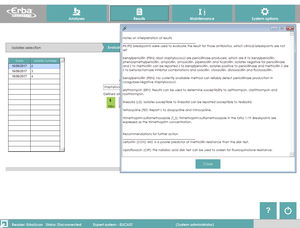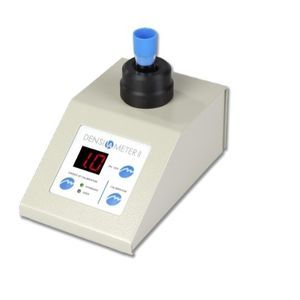
Microbiology test strip MIKROLATEST®iron
Add to favorites
Compare this product
Characteristics
- Application field
- for microbiology
- Tested parameter
- iron
- Result display time
Max.: 4 min
Min.: 1 min
Description
MIKROLATEST® detection strips are plastic strips with a porous zone made from filter paper containing reagent substrate for detection of bacterial enzyme or metabolite. Strips are a modern, user-friendly and economical alternative to diagnostic discs. According to their types, the bacterial culture tested is either rubbed into the reagent zone or the strip is inserted into a tube containing an examined bacterial suspension and cultured. The detection strips are used either together with MIKROLATEST® identification kits for the additional testing or separately. In some cases, additional reagents should be used in order to improve reaction sensitivity. One strip package is sufficient for 50 examinations.
Features of MIKROLATEST® detection strips:
user-friendly – easy manipulation without any other aids
reliable quality – standard and reproducible results
fast detection – results available within 1 minute, 1-4 minutes or not later than within 48 hours, according to the test and the microorganism type
MIKROLATEST® detection strips include:
plastic tube containing 50 pcs of strips
instructions for use
Storage:
Detection strips should be stored in a refrigerator at the temperature of +2 up to +8 °C.
Available strips
OXItest
OXItest detection strip is designed for bacterial cytochromoxidase detection. Its presence is detected by a colour reaction of N,N-dimethyl-1,4-phenylenediamine with α-naphthol accompanied by formation of indophenol blue. Iron, contained in a cytochrome molecule, is responsible for cytochrome oxidation/reduction process. To avoid the interference due to iron ions, it’s necessary to use plastic or platinum loop when carrying out this test.
Catalogs
MIKROLATEST® BP
2 Pages
ErbaScan ErbaExpert
2 Pages
Related Searches
- Assay kit
- Blood assay kit
- Serum assay kit
- Immunoassay assay kit
- Diagnostic reagent kit
- Molecular test kit
- Enzyme reagent kit
- Respiratory infection test kit
- ELISA assay kit
- COVID-19 detection kit
- Clinical chemistry analyzer
- Quality control reagent kit
- Automatic clinical chemistry analyzer
- Clinical reagent kit
- Benchtop clinical chemistry analyzer
- Strip detection kit
- Test strip
- IgG test kit
- Urine assay kit
- Nasopharyngeal assay kit
*Prices are pre-tax. They exclude delivery charges and customs duties and do not include additional charges for installation or activation options. Prices are indicative only and may vary by country, with changes to the cost of raw materials and exchange rates.









